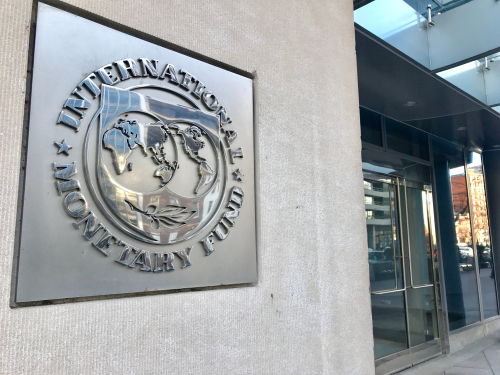IMF Warns Surge in U.S., China Debt Could Have ‘Profound’ Impact on Global Economy
Says U.S. and China, which will continue to see a surge in borrowing if current policies remain in place.
The U.S. and Chinese governments should take action to lower future borrowing, as a surge in their debts threatens to have “profound” effects on the global economy and the interest rates paid by other countries, the International Monetary Fund said Wednesday.
In its twice-yearly report on government borrowing, the Fund said many rich countries have adopted measures that will lead to a reduction in their debts relative to the size of their economies, although not to the levels seen before the Covid-19 pandemic.
However, that is not true of the U.S. and China, which will continue to see a surge in borrowing if current policies remain in place. The Fund projected that U.S. government debt relative to economic output will rise by 70% by 2053, while Chinese debt will more than double by the same year.
The Fund said both countries will lead a rise in global government debt to 98.8% of economic output in 2029 from 93.2% in 2023. The U.K. and Italy are among the other big contributors to that increase.
“The increase will be led by some large economies, for example, China, Italy, the United Kingdom, and the United States, which critically need to take policy action to address fundamental imbalances between spending and revenues,” the IMF said.
The IMF expects U.S. government debt to be 133.9% of annual gross domestic product in 2029, up from 122.1% in 2023. And it expects China’s debt to rise to 110.1% of GDP by the same year from 83.6%.
The Fund said there had been “large fiscal slippages” in the U.S. during 2023, with government spending exceeding revenues by 8.8% of GDP, up from 4.1% in the previous year. It expects the budget deficit to exceed 6% over the medium term.
That level of borrowing is slowing progress toward reducing inflation, the Fund said, and may also increase the interest rates paid by other governments.
“Loose US fiscal policy could make the last mile of disinflation harder to achieve while exacerbating the debt burden,” the Fund said. “Further, global interest rate spillovers could contribute to tighter financial conditions, increasing risks elsewhere.”
A series of weak auctions for U.S. Treasurys are stoking investors’ concerns that markets will struggle to absorb an incoming rush of government debt. The government is poised to sell another $386 billion or so of bonds in May—an onslaught that Wall Street expects to continue no matter who wins November’s presidential election.
While analysts don’t expect those sales to fail, a sharp rise in U.S. bond yields would likely have consequences for borrowers around the world. The IMF estimated that a rise of one percentage point in U.S. yields leads to a matching rise for developing economies and an increase of 90 basis points in other rich countries.
“Long-term government bond yields in the United States remain elevated and sensitive to inflation developments and monetary policy decisions,” the Fund said. “This could lead to volatile financing conditions in other economies.”
China’s budget deficit fell to 7.1% of GDP in 2023 from 7.5% the previous year, but the IMF projects a steady pickup from this year to 7.9% in 2029. It warned that a slowdown in the world’s second largest economy “exacerbated by unintended fiscal tightening” would likely weaken growth elsewhere, and reduce aid flows that have become a significant source of funding for governments in Africa and Latin America.
An unusually large number of elections is likely to push government borrowing higher this year, the Fund said. It estimates that 88 economies or economic areas are set for significant votes, and that budget deficits tend to be 0.3% of GDP higher in election years than in other years.
“What makes this year different is not only the confluence of elections, but the fact that they will happen amid higher demand for public spending,” the Fund said. “The bias toward higher spending is shared across the political spectrum, indicating substantial challenges in gathering support for consolidation in the years ahead, and particularly in a key election year like 2024.”
 Copyright 2020, Dow Jones & Company, Inc. All Rights Reserved Worldwide. LEARN MORE
Copyright 2020, Dow Jones & Company, Inc. All Rights Reserved Worldwide. LEARN MORE
This stylish family home combines a classic palette and finishes with a flexible floorplan
Just 55 minutes from Sydney, make this your creative getaway located in the majestic Hawkesbury region.
Continued stagflation and cost of living pressures are causing couples to think twice about starting a family, new data has revealed, with long term impacts expected
Australia is in the midst of a ‘baby recession’ with preliminary estimates showing the number of births in 2023 fell by more than four percent to the lowest level since 2006, according to KPMG. The consultancy firm says this reflects the impact of cost-of-living pressures on the feasibility of younger Australians starting a family.
KPMG estimates that 289,100 babies were born in 2023. This compares to 300,684 babies in 2022 and 309,996 in 2021, according to the Australian Bureau of Statistics (ABS). KPMG urban economist Terry Rawnsley said weak economic growth often leads to a reduced number of births. In 2023, ABS data shows gross domestic product (GDP) fell to 1.5 percent. Despite the population growing by 2.5 percent in 2023, GDP on a per capita basis went into negative territory, down one percent over the 12 months.
“Birth rates provide insight into long-term population growth as well as the current confidence of Australian families,” said Mr Rawnsley. “We haven’t seen such a sharp drop in births in Australia since the period of economic stagflation in the 1970s, which coincided with the initial widespread adoption of the contraceptive pill.”
Mr Rawnsley said many Australian couples delayed starting a family while the pandemic played out in 2020. The number of births fell from 305,832 in 2019 to 294,369 in 2020. Then in 2021, strong employment and vast amounts of stimulus money, along with high household savings due to lockdowns, gave couples better financial means to have a baby. This led to a rebound in births.
However, the re-opening of the global economy in 2022 led to soaring inflation. By the start of 2023, the Australian consumer price index (CPI) had risen to its highest level since 1990 at 7.8 percent per annum. By that stage, the Reserve Bank had already commenced an aggressive rate-hiking strategy to fight inflation and had raised the cash rate every month between May and December 2022.
Five more rate hikes during 2023 put further pressure on couples with mortgages and put the brakes on family formation. “This combination of the pandemic and rapid economic changes explains the spike and subsequent sharp decline in birth rates we have observed over the past four years,” Mr Rawnsley said.
The impact of high costs of living on couples’ decision to have a baby is highlighted in births data for the capital cities. KPMG estimates there were 60,860 births in Sydney in 2023, down 8.6 percent from 2019. There were 56,270 births in Melbourne, down 7.3 percent. In Perth, there were 25,020 births, down 6 percent, while in Brisbane there were 30,250 births, down 4.3 percent. Canberra was the only capital city where there was no fall in the number of births in 2023 compared to 2019.
“CPI growth in Canberra has been slightly subdued compared to that in other major cities, and the economic outlook has remained strong,” Mr Rawnsley said. “This means families have not been hurting as much as those in other capital cities, and in turn, we’ve seen a stabilisation of births in the ACT.”
This stylish family home combines a classic palette and finishes with a flexible floorplan
Just 55 minutes from Sydney, make this your creative getaway located in the majestic Hawkesbury region.






















